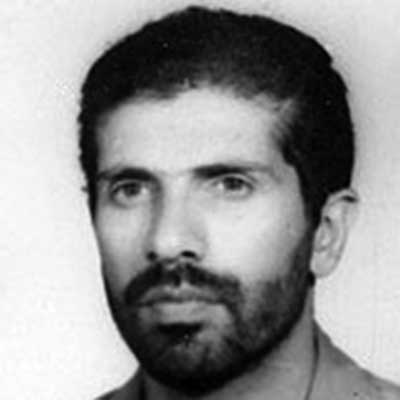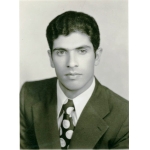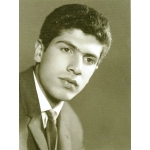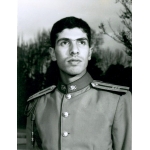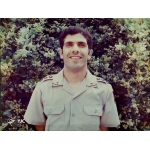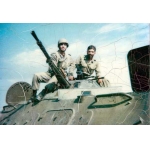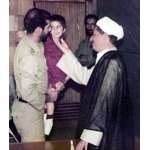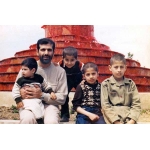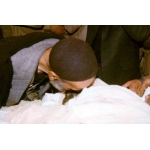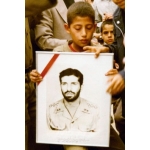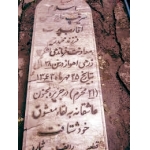Aqarebparast, Hasan
Shahrzad Muhammadi
296 بازدید
Hasan Aqarebparast served as an officer and the deputy commander of the 92nd Armored Division of the Islamic Republic of Iran Army Ground Forces during the Iran-Iraq War. At the onset of the war, he went to Khorramshahr and was martyred on October 17, 1984, on Majnoon Island.
Born on May 18, 1946, In Isfahan, Aqarebparast, completed his primary education, there before moving on to high school in Zarrinshahr. In 1964, armed with a diploma in mathematics, he began working in a pharmacy. In 1965, he was admitted to the Officers’ Academy after passing the entrance exam. During his studies at the Academy, he met Mousa Namjooy and Yousef Kolahdouz. Shortly afterwards, at Namjooy’s suggestion, he joined a secret military-political-religious organization, a covert network that included notable figures like Hojjatoleslam Muhammad Montazeri and Dr. Hasan Ayat. His meetings with Kolahdouz during the activities related to the organization led to a deep friendship. In 1968, both graduated from the Officers’ Academy as second lieutenants. Their next stop was Shiraz for armored training. Even in Shiraz, Aqarebparast and Kolahdouz remained committed to their secret organization. While studying, Aqarebparast took up martial arts, horseback riding, and polo. In 1971, he married Kolahdouz’s sister, resulting in the birth of four boys.
In 1972, Aqarebparast was sent by the Shiraz Armored Center to England. There he was trained in Chieftain tank and microbial warfare. During this time, he traveled to several countries to participate in various chemical warfare training courses.
Upon returning to Iran, Aqarebparast held classes in Shiraz, teaching anti-microbial defense, and instructing military personnel on the principles of microbial warfare. Concurrently, he recruited dedicated forces within the Army and introduced new members to his secret organization.
In 1974, Aqarebparast was sent to the United States. After returning to Iran, he took a trip to Karbala and Najaf where he met with Imam Khomeini (ra), pledging his allegiance and expressing his readiness to engage in any political and revolutionary activity.
The next year, Aqarebparast, along with five other officers, returned to the United States for advanced military training.
After returning to Iran, he assumed a teaching position at the Shiraz Armored Center. In 1978, he moved to Tehran to attend the command and staff course. As the revolutionary movement against the Pahlavi regime intensified, Aqarebparast and Kolahdouz began distributing recordings of Imam Khomeini’s statements and speeches throughout the city and the barracks.
Following the victory of the Islamic Revolution, Hasan Aqarebparast, in collaboration with Ayatollah Beheshti, Ayatollah Mousavi Ardebili, Kolahdouz, and Abd al-Reza Nazari Zadeh Kermani, reopened the Joint Staff of the Islamic Republic of Iran Army on Imam Khomeini's orders. Aqarebparast was designated to rebuild the Army's human resources section, working with Ayatollah Khamenei to select and assign commanders.
With the onset of the Iran-Iraq War, Aqarebparast, the deputy head of the Second Bureau of the Joint Staff, volunteered to go to Khorramshahr. Leveraging his military knowledge and available resources, he organized and briefed the forces. He even conducted funeral prayers for the martyrs and arranged for their bodies to be sent back or buried with formal ceremonies. His efforts, combined with the assistance of local and volunteer army personnel, delayed the fall of Khorramshahr by forty days. He remained in the city until its eventual capture.
After the occupation of Khorramshahr by Iraqi forces, Aqarebparast traveled to Abadan. There, alongside Seyyed Muhammad Ali Sharif al-Nasab, he established a resistance headquarters at the Abadan Gendarmerie. With the assistance of local forces, they secured control over the Bahmanshir and Zolfaqari fronts, preventing the Iraqi forces from entering the besieged Abadan. Utilizing captured enemy equipment and vehicles, he formed the Al-Mahdi
(as) Armored Battalion, repairing damaged tanks abandoned in Khorramshahr and Abadan with the assistance of skilled personnel. This battalion played a pivotal role in breaking the siege of Abadan. On January 10, 1981, he was shot in the throat by the Iraqi forces and due to severe bleeding was transferred to Abadan Hospital. Remarkably, after recovery, he returned to the war zone.
In 1981, Aqarebparast undertook the Hajj pilgrimage to Mecca. Upon his return, he joined the Second Bureau of the Joint Staff in Tehran, where he served until 1983. He volunteered for Operation Fath al-Mobin on March 22, 1982, holding the rank of lieutenant colonel. Later that same year, he assumed the role of deputy commander of the 92nd Armored Division in Ahvaz, In the early days of his service, Aqarebparast diligently inspected military units and barracks across Ahvaz, Dezful, Dasht-e Azdegan, and Haftgel. In March 1984, he took part in Operation Kheibar helping Muhammad Ebrahim Hemmat, the commander of the Muhammad Rasulullah (pbuh) Division. He frequently visited the division’s rear lines and areas, barracks, and facilities of the 92nd Armored Division, coordinating necessary actions at the headquarters. His military capabilities became more evident after Operation Kheibar, as he successfully moved the 92nd Division's units closer to Iraqi positions. He was among the first to play a significant role in constructing the Kheibar Bridge and the Seyyed al-Shohada (as) Road .
Along with several commanders, Hasan Aqarebparast was martyred on October 17, 1984, due to a mortar attack, while scouting Iraqi forces on Majnoon Island. His grave is located in Section 24 of Behesht-e Zahra Cemetery in Tehran.
In 1997, the Municipality of Isfahan constructed a highway named after Hasan Aqarebparast. On April 18, 2015, the new wheeled tank produced by the Islamic Republic of Iran Army, was named "Aqareb," in honor of Hasan Aqarebparast.
In one of his speeches made on April 11, 2003, during the Friday prayers, the Supreme Leader and Commander-in-Chief stated: "I would like to commemorate the beloved martyrs of Khorramshahr and the those who resisted so valiantly in that city, especially Muhammad Jahanara. In those days, I was in Ahvaz and witnessed the events closely. In fact, there were no armed forces in Khorramshahr. Only, a few broken-down tanks were brought to the city from Khosrowabad by martyr Aqarebparast, a highly dedicated military officer who repaired the tanks".


